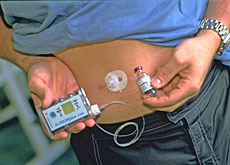Zurich researchers make diabetes breakthrough

Scientists at Zurich University have developed a promising new therapy that targets the progression of diabetes type 2, the most common form of the disease.
Type 2, which affects 90 per cent of diabetics, is on the rise worldwide due to health and lifestyle factors, such as being overweight.
Several companies are already interested in the treatment – the first of its kind for type 2 diabetes – with a drug estimated to come onto the market in three to five years’ time.
The results of the international study, led by Marc Donath, professor of endocrinology and diabetes at Zurich University Hospital, were published in the prestigious New England Journal of Medicine on Thursday.
Diabetes is an incurable condition in which there is too much glucose in the blood. Type 2 normally develops in later life and can lead to health complications, such as heart and liver problems.
In the study, Donath and his team found that daily injections of anakinra – a drug also used to treat rheumatoid arthritis – helped patients by targeting a cause of the disease.
“Until now we had treatments which weren’t able really to stop progression of the disease and here we are interfering with a mechanism responsible for it,” Donath told swissinfo.
Insulin problems
Type 2 diabetes occurs when the body cannot produce enough insulin or use it effectively. Insulin, a hormone produced in the pancreas, is needed to transport sugar from the blood to cells, where it is used for energy.
Insulin-producing beta cells are sometimes destroyed in type 2 diabetes. Donath and his team already knew that a substance called interleukin-1 beta was responsible for this in type 2.
Anakinra is an interleukin-1-receptor antagonist – it blocks the action of the interleukin-1 beta.
To test the effects of the drug in type 2 diabetes, 36 people received a once-daily placebo injection and 34 people received a daily dose of 100 mg of anakinra for 13 weeks.
Scientists found that glucose levels were lower and the secretion of insulin better in the group that had taken anakinra. Patients also showed reduced systematic inflammation in the body – a contributory factor for diabetes-related complications, such as heart problems.
The drug was found to have few side effects and Donath and his team are planning to conduct follow-up studies.
Common disease
The discovery could help fight a disease that is becoming increasingly common, said Donath. Around 500,000 people are said to have diabetes in Switzerland.
“Around 246 million patients worldwide have diabetes,” he told swissinfo. “What is especially worrying is that a dramatic increase is expected in the next years, not only in western countries, but also in Africa and India.”
Donath said his next step was to develop a treatment that could be used at least once a month, rather than the daily medications currently used by patients.
Two United States companies have expressed interest in developing the research.
Donath is convinced the new treatment could help thousands of patients lead more normal lives, especially as it has already been used for many years to treat rheumatoid arthritis.
“I’m not saying it’s a magic pill but currently it seems to be very safe,” he said.
swissinfo, Isobel Leybold-Johnson in Zurich
Marc Donath, who is also a practising doctor, has been researching treatment for type 2 diabetes for ten years.
The study was carried out in conjunction with the Steno Diabetes Center in Denmark.
Patients in Zurich also took part.
Many patients who develop the disease are overweight and most are in the 40-59 age band, but children and young people are becoming increasingly affected. Once developed the condition persists throughout a patient’s lifetime.
Apart from lack of exercise and a poor diet, family history, genetics can also contribute significantly to the risk of developing type 2. Many people do not realise they have it.
The rise of diabetes type 2 is causing widespread concern among health experts. In the next 20 years the number of those affected is expected to rise to 380 million worldwide.
There also exists type 1 diabetes where the body is unable to produce any insulin. This usually starts in childhood or young adulthood. Treatment is through diet control and insulin injections.

In compliance with the JTI standards
More: SWI swissinfo.ch certified by the Journalism Trust Initiative



You can find an overview of ongoing debates with our journalists here. Please join us!
If you want to start a conversation about a topic raised in this article or want to report factual errors, email us at english@swissinfo.ch.